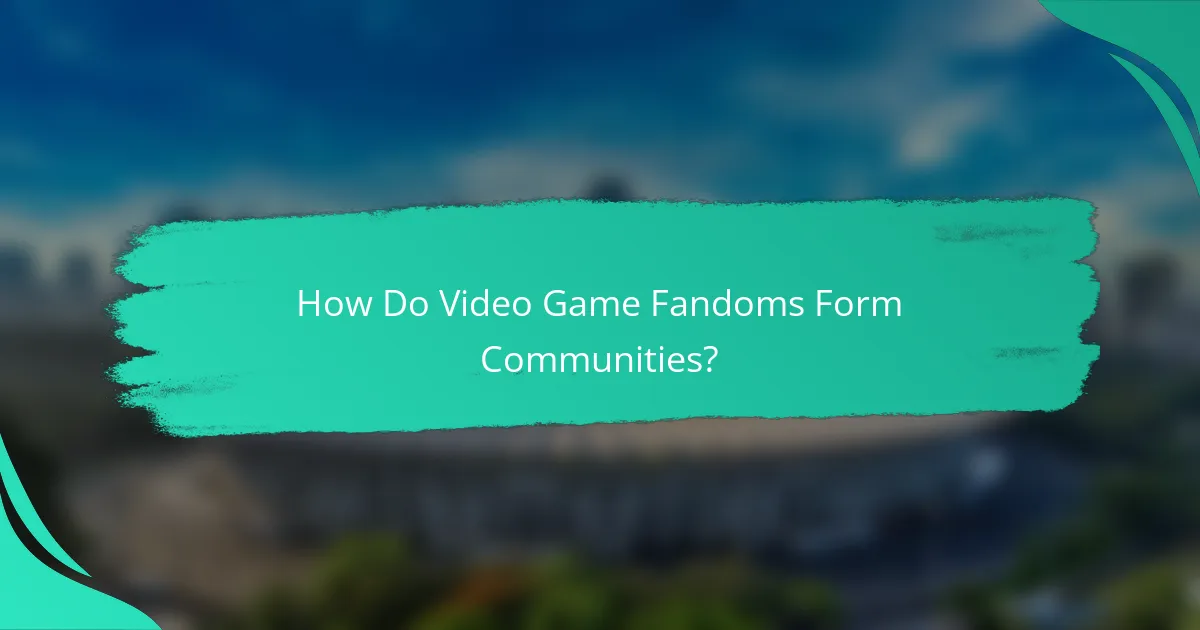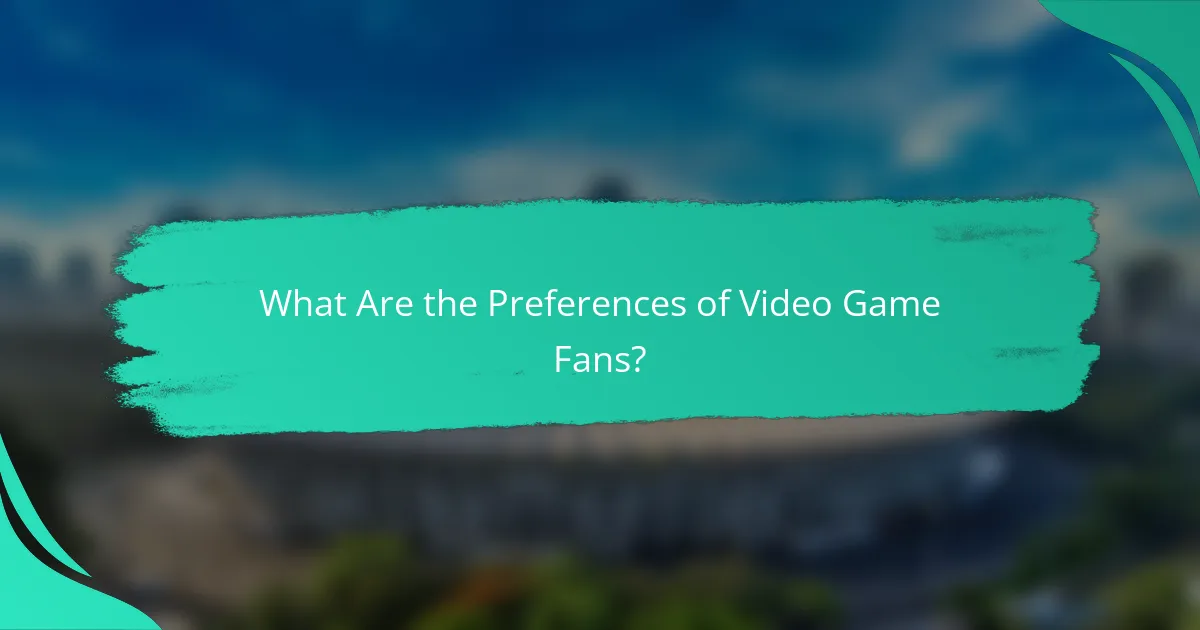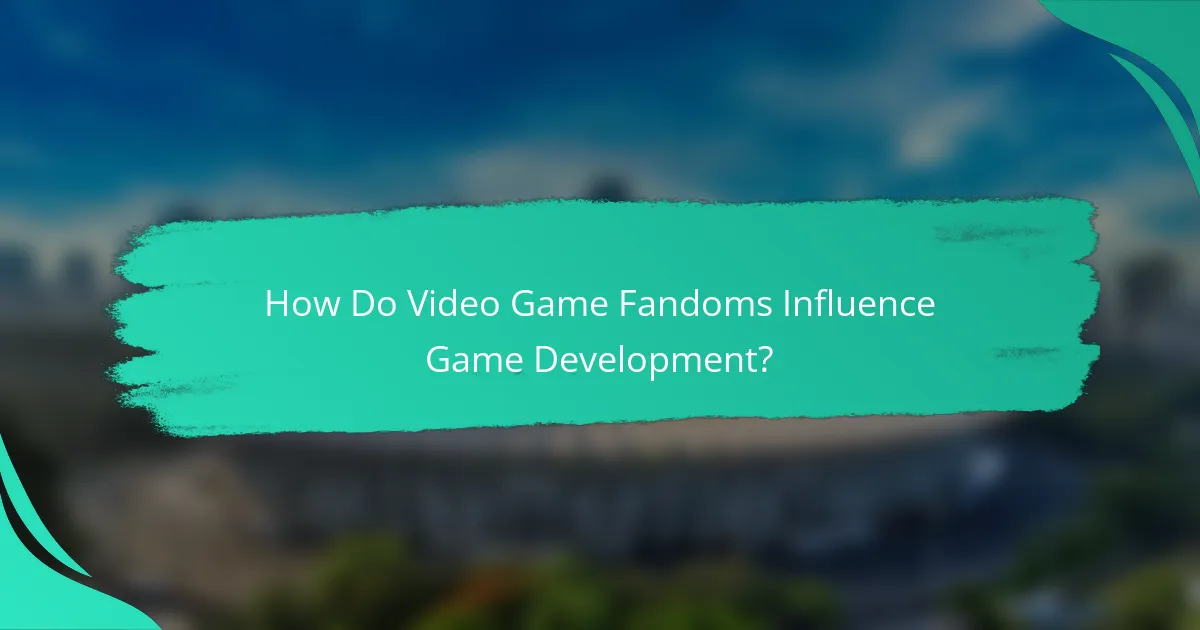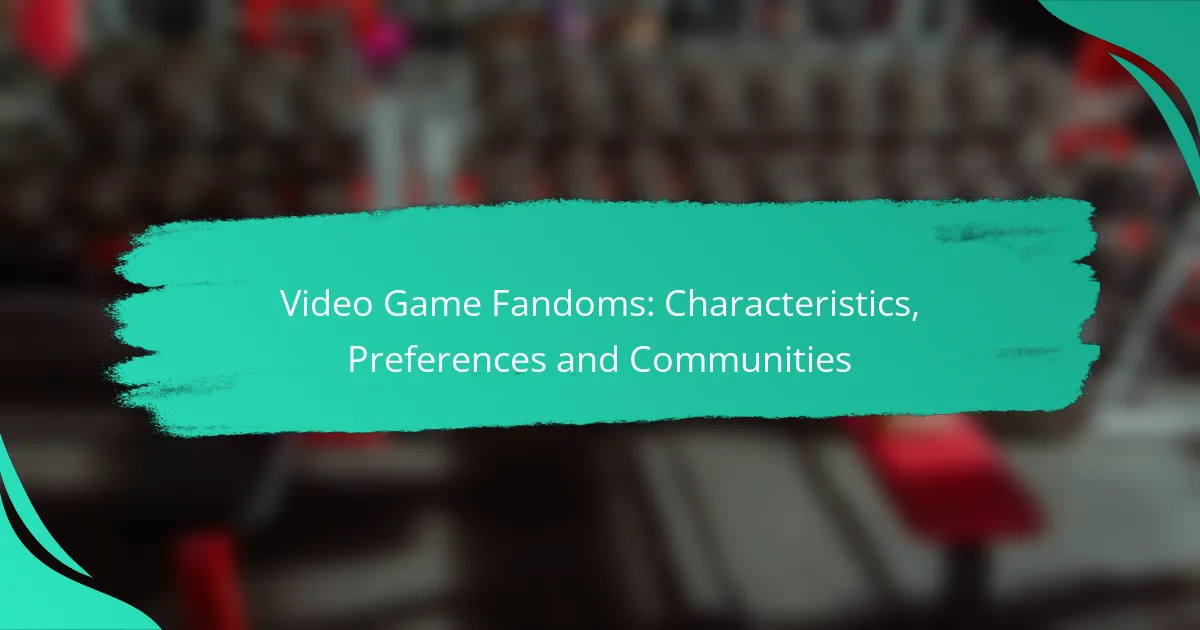Video game fandoms are vibrant communities characterized by passionate engagement and shared experiences among players. These groups thrive on diverse preferences, connecting over favorite games, genres, and storytelling elements, both online and offline. Through their collective love for gaming, fans forge emotional bonds that extend beyond the virtual world, creating a rich tapestry of interactions and collaborations.

What Are the Key Characteristics of Video Game Fandoms?
Video game fandoms are defined by their passionate engagement, community-driven content, diverse demographics, shared experiences, and emotional connections. These characteristics create vibrant communities where players unite over their love for games, forming bonds that extend beyond the screen.
Passionate engagement
Members of video game fandoms often display intense enthusiasm for their favorite games, franchises, or genres. This engagement can manifest through various activities, such as streaming gameplay, participating in forums, or attending conventions dedicated to gaming culture.
Passionate fans frequently invest significant time and resources into their hobbies, whether through purchasing merchandise, creating fan art, or developing mods. This level of commitment fosters a sense of belonging and identity within the fandom.
Community-driven content
Video game fandoms thrive on community-generated content, which includes fan fiction, videos, and artwork. Platforms like YouTube and Twitch enable fans to share their creations and engage with others who share similar interests.
Additionally, many fandoms organize collaborative projects, such as game development or charity events, showcasing the collective creativity and skills of their members. This collaborative spirit strengthens community ties and encourages participation.
Diverse demographics
Video game fandoms encompass a wide range of demographics, including different ages, genders, and cultural backgrounds. This diversity enriches the community, bringing various perspectives and experiences to discussions and activities.
As gaming continues to evolve, attracting a broader audience, fandoms are increasingly inclusive. This inclusivity fosters a welcoming environment where individuals can connect over their shared passion for gaming, regardless of their background.
Shared experiences
Shared experiences, such as playing multiplayer games or participating in online events, are central to video game fandoms. These interactions create lasting memories and foster camaraderie among players.
Events like game launches, tournaments, and fan conventions provide opportunities for fans to come together, share their excitement, and celebrate their favorite games. These gatherings often lead to friendships that extend beyond the gaming world.
Emotional connections
Video game fandoms often form strong emotional connections among members, driven by shared interests and experiences. Fans frequently express their feelings about games through discussions, fan art, and social media posts.
These emotional ties can lead to supportive communities where members share personal stories and seek advice. This sense of belonging can be particularly valuable for individuals facing challenges in their lives, as the fandom provides a safe space for connection and understanding.

How Do Video Game Fandoms Form Communities?
Video game fandoms form communities through shared interests, interactions, and collaborative experiences. These communities often thrive in various online and offline spaces, where fans connect over their favorite games, characters, and gaming culture.
Online forums and social media
Online forums and social media platforms are crucial for video game fandoms, providing spaces for discussion, sharing content, and organizing events. Popular platforms like Reddit, Discord, and Facebook host dedicated groups where fans can engage in conversations, post fan art, and share gameplay tips.
These platforms allow for real-time interaction and can lead to the formation of tight-knit communities. Fans often create threads or channels focused on specific games, fostering deeper connections among members who share similar interests.
Gaming conventions and events
Gaming conventions and events serve as physical meeting points for fans to celebrate their shared passion. Events like PAX, E3, and local gaming expos provide opportunities for fans to meet developers, participate in panels, and engage in multiplayer competitions.
Attending these events can enhance the sense of community, as fans often travel together, share experiences, and create lasting memories. Networking at these conventions can lead to friendships that extend beyond the event itself.
Streaming platforms like Twitch
Streaming platforms like Twitch have revolutionized how video game fandoms interact, allowing fans to watch live gameplay and engage with streamers in real time. Viewers can chat with each other and the streamer, creating a communal viewing experience that fosters connections among fans.
Many fandoms rally around popular streamers, leading to the formation of sub-communities based on shared interests in specific games or personalities. Engaging with streamers through donations or subscriptions can also enhance the sense of belonging within these communities.

What Are the Preferences of Video Game Fans?
Video game fans exhibit diverse preferences that shape their gaming experiences and community interactions. These preferences often revolve around specific genres, platforms, and the mechanics or storytelling elements that resonate with them.
Genre-specific interests
Genre-specific interests play a significant role in defining a video game fan’s preferences. Popular genres include action, role-playing, strategy, and simulation, each attracting distinct audiences. For instance, fans of role-playing games (RPGs) often seek immersive narratives and character development, while action game enthusiasts may prioritize fast-paced gameplay and reflex challenges.
Understanding genre preferences can help fans discover new games that align with their tastes. Engaging in forums or communities dedicated to specific genres can also enhance the gaming experience by providing recommendations and insights from like-minded individuals.
Platform loyalty
Platform loyalty is another key aspect of video game fandom. Fans often develop strong attachments to specific gaming consoles, PCs, or mobile devices, influenced by factors such as exclusive titles, performance, and community support. For example, many fans of Nintendo are drawn to its exclusive franchises like Mario and Zelda, while others may prefer the graphics and capabilities of high-end gaming PCs.
When choosing a platform, fans should consider the availability of games, online services, and social features that enhance multiplayer experiences. Staying informed about upcoming releases and platform updates can also help fans make the most of their chosen gaming environment.
Game mechanics and storytelling
Game mechanics and storytelling are crucial elements that influence the preferences of video game fans. Fans often gravitate towards games that offer engaging mechanics, such as strategic combat, crafting systems, or puzzle-solving elements. Additionally, a compelling narrative can significantly enhance the gaming experience, drawing players into the game’s world and characters.
To find games that align with their preferences, fans should explore reviews and gameplay videos that highlight mechanics and story elements. Participating in discussions about favorite games can also provide insights into what makes certain mechanics or narratives appealing, helping fans refine their gaming choices.

How Do Video Game Fandoms Influence Game Development?
Video game fandoms significantly impact game development by providing valuable feedback, creating content, and participating in testing phases. Developers often rely on these communities to refine their games and ensure they meet player expectations.
Feedback and community input
Fandoms offer crucial feedback that can shape game mechanics, storylines, and overall design. Developers often monitor forums, social media, and surveys to gather insights directly from players, allowing them to make informed adjustments before and after release.
For instance, a game studio might implement changes based on fan suggestions regarding character balance or gameplay pacing. This iterative process helps ensure that the final product resonates with its audience, enhancing player satisfaction.
Fan-created content
Fans frequently contribute to the gaming ecosystem through fan art, mods, and fan fiction, which can enrich the game’s universe. This user-generated content not only fosters community engagement but can also inspire developers to incorporate similar elements into official releases.
For example, mods can introduce new gameplay features or storylines, which may lead developers to adopt successful ideas in future updates or sequels. This symbiotic relationship between fans and developers can create a more vibrant gaming experience.
Beta testing and early access
Many developers utilize beta testing and early access programs to engage fandoms in the development process. By allowing fans to play unfinished versions of games, developers can gather real-time feedback and identify bugs before the official launch.
Participating in these programs can provide fans with a sense of ownership and investment in the game’s success. However, developers should be cautious about balancing fan expectations with the realities of game development, as early feedback can sometimes lead to conflicting opinions among the community.

What Are the Economic Impacts of Video Game Fandoms?
Video game fandoms significantly influence the economy through various channels, including merchandising and esports. These communities drive demand for products and services, creating substantial revenue streams for developers and related industries.
Merchandising opportunities
Merchandising is a key economic impact of video game fandoms, encompassing a range of products such as apparel, collectibles, and in-game items. Fans often seek physical representations of their favorite games, leading to a lucrative market for merchandise sales.
For example, popular franchises can generate millions in revenue from merchandise alone, with items like action figures and clothing often selling for $20 to $100 each. Companies should consider collaborating with artists and influencers to create unique merchandise that resonates with fans.
Esports revenue generation
Esports has emerged as a major revenue generator within the video game fandom landscape, attracting sponsorships, advertising, and ticket sales. Major tournaments can draw thousands of spectators both in-person and online, creating a vibrant ecosystem for monetization.
Revenue from esports can range from hundreds of thousands to millions of dollars per event, depending on the game’s popularity and sponsorship deals. Brands looking to enter this space should focus on partnerships with established teams and events to maximize visibility and engagement.
